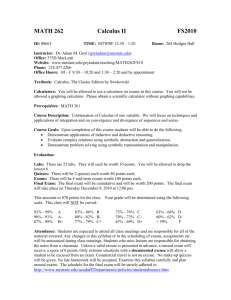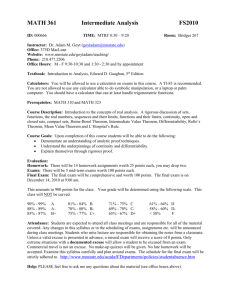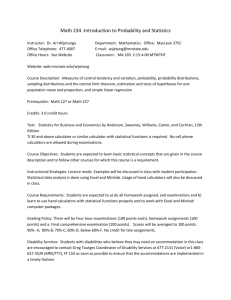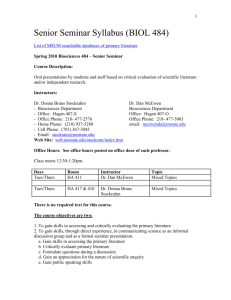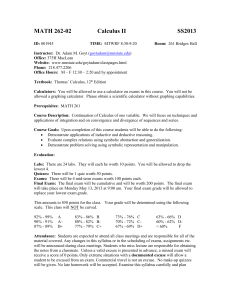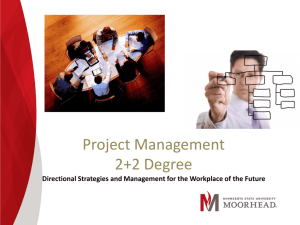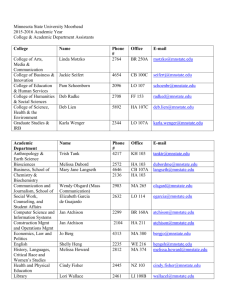Analytics in Academic Advising: Using Data to Make Decisions MSU
advertisement
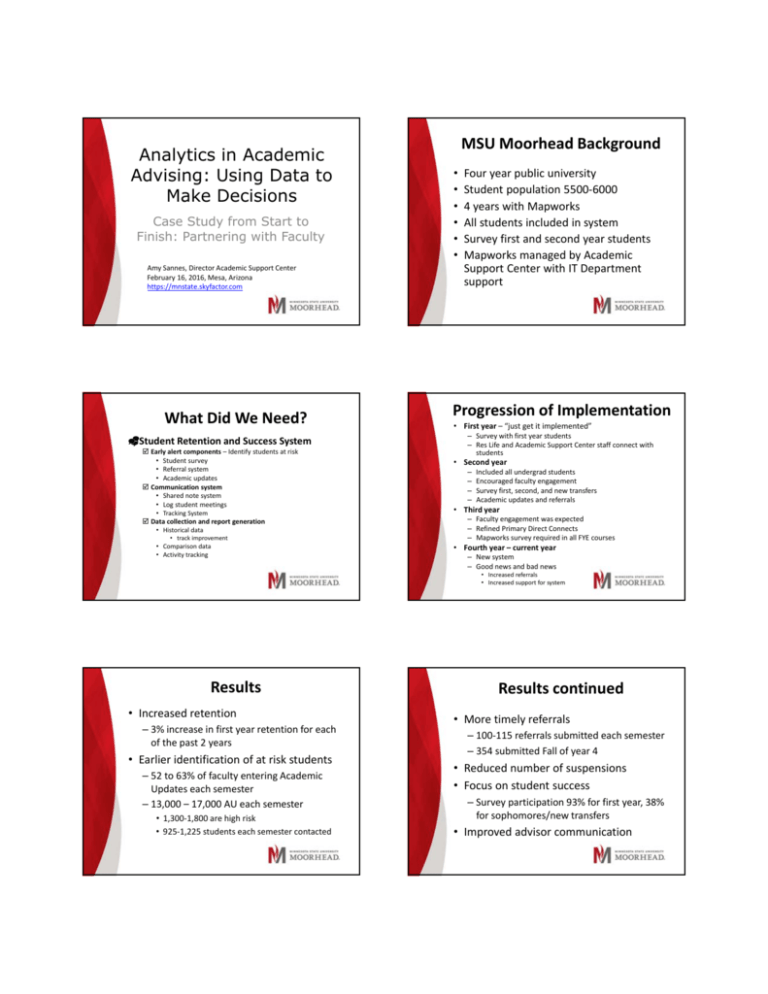
Analytics in Academic Advising: Using Data to Make Decisions Case Study from Start to Finish: Partnering with Faculty Amy Sannes, Director Academic Support Center February 16, 2016, Mesa, Arizona https://mnstate.skyfactor.com What Did We Need? Student Retention and Success System Early alert components – Identify students at risk • Student survey • Referral system • Academic updates Communication system • Shared note system • Log student meetings • Tracking System Data collection and report generation • Historical data • track improvement • Comparison data • Activity tracking MSU Moorhead Background • • • • • • Four year public university Student population 5500‐6000 4 years with Mapworks All students included in system Survey first and second year students Mapworks managed by Academic Support Center with IT Department support Progression of Implementation • First year – “just get it implemented” – Survey with first year students – Res Life and Academic Support Center staff connect with students • Second year – – – – Included all undergrad students Encouraged faculty engagement Survey first, second, and new transfers Academic updates and referrals • Third year – Faculty engagement was expected – Refined Primary Direct Connects – Mapworks survey required in all FYE courses • Fourth year – current year – New system – Good news and bad news • Increased referrals • Increased support for system Results • Increased retention – 3% increase in first year retention for each of the past 2 years • Earlier identification of at risk students – 52 to 63% of faculty entering Academic Updates each semester – 13,000 – 17,000 AU each semester • 1,300‐1,800 are high risk • 925‐1,225 students each semester contacted Results continued • More timely referrals – 100‐115 referrals submitted each semester – 354 submitted Fall of year 4 • Reduced number of suspensions • Focus on student success – Survey participation 93% for first year, 38% for sophomores/new transfers • Improved advisor communication LEAD Advisor Program Advising at MSUM • Shared model for advising • Faculty advising – 5 colleges • Unionized environment – faculty “own” advising • Professional advisors (2) for pre‐majors • Professional advisors for exploring students • Student Relations Coordinators (3) for unofficial advising in Colleges • Academic Support Center – advising center Lead, Engage, Advise, Develop One faculty member per department Fall 2013 full day training for LEADs Faculty development workshop focused on advising and Mapworks • LEAD Advisors met with department and trained all faculty in department • • • • Early Alert Components Your Success Report Transition Two 01/27/2016 Identify students at risk • Student Survey Special thank you to Taylor Pfarr for permission to use her profile for presentation. – First year and sophomores/new transfers Welcome Taylor! Available 4 times per year – we use 2 times Week 3‐4 Double Red, Red, yellow, or green Residence life staff involvement FYE Course integration Targeted interventions Survey response rates • • • • • • • The following report is about you and was created from your survey responses. It’s designed to support you and ensure your success. – Fall = 93% first year, 38% sophomores/transfers – Spring = 50% and 35% Pfarr, Tayllor | pfarrta@mnstate.e du Earning the Grades You Want Basic Academic Behaviors TRANSITION ONE TRANSITIONTWO Class Attendanc e TRANSITION ONE TRANSITIONTWO Connecting with Others Time Managemen t TRANSITION ONE TRANSITIONTWO Academic SelfConfidence TRANSITION ONE TRANSITIONTWO Your Strengths & Weaknesses Basic Academic Behaviors - You have excellent academic behaviors! These skills typically lead to good grades; keep up the good work! It is important to sustain your current level of performance throughout the entire term. Tip: Talking with your instructors is a proven way to get the most from your classes! At any point you need help, contact your campus connections faulty/staff members (see the list at the end of this report). Class Attendance - Congratulations! You understand the importance of class attendance. Many students don't realize that attending every class is crucial to academic success in college. Did you know that students who miss a class every once in a while earn an average GPA nearly a letter grade lower than students with perfect or near perfect class attendance? Furthermore, it is important to be active in class. Being mentally present in the class is just as important as being physically present. Time Management - You have good time management skills. Keep up the good work! As you know, it's important to organize your time and to keep academics high on your priority list. Did you know that good time management skills are linked to higher GPAs? Improving your skills will allow you to be more efficient with your time and more effective in achieving good grades. Academic Self-Confidence - You have moderate confidence in your academic abilities. Students with moderate confidence tend to do well until they face a challenge. They might give up on a task early when they feel stressed. If this happens, contact one of us immediately for help. Course Difficulties - You're struggling in at least two courses. Struggling in multiple courses dramatically increases your risk of earning a poor GPA. First, talk to those course instructors today. Don't wait. Second, contact one of us; we can help. To achieve the grades you expect you must take action now! Pfarr, Tayllor | pfarrta@mnstate.e du Transition Two | Success Report 10/8 Course Difficultie s TRANSITION ONE TRANSITIONTWO Campus Involvemen t TRANSITION ONE TRANSITIONTWO Sense of Belongin g TRANSITION ONE TRANSITIONTWO Your Strengths & Weaknesses Tips on Improving Create a Study Group - Assemble a group of other students in your classes who can study together, provide feedback on work, share notes, and motivate each other to do well in the class. Tallk to Your Instructors - If you're struggling in a class, contact the instructor immediately and discuss steps you can take to improve your performance. Make an appointment with your academic advisor to discuss available resources, such as tutoring and study skill seminars. Campus Involvement - You want to be involved on our campus? That's great news! We love your enthusiasm. Getting involved is a great way to make the most of your college experience. The foundation for success extends beyond the classroom; the opportunities and experiences provided by campus activities are as important as your classroom experience when it comes to your future success. Sense of Belonging - It's great news that you feel connected on campus! Remember that there are always new opportunities to make friends and build new relationships through student organizations, intramural sports, and community service projects! Tips on Improving Connect - Making connections with students, faculty, and staff often takes time and effort. Reach out to others who may be struggling to make a connection and be open to building friendships with those who reach out to you. Create a Cllub - If our institution doesn't have a club or organization that matches your interest, consider developing one. Contact our student activities/student life office about how you may be able to do this. Joiin In - Consider joining a social/professional organization, activity, or intramural sport. Or, volunteer your time to a cause that is important to you. Take Personall Responsiibiilliity - Make a commitment to practice good academic behaviors such as attending all classes and completing assignments on time. Get a planner or an app that allows you to record assignments and due dates to help manage your time and class demands. Take Advantage of Campus Resources - There are many resources on campus that can help you overcome academic hurdles. Please see the list of campus resources at the end of this report. Transition Two | Success Report 11/8 Pfarr, Tayllor | pfarrta@mnstate.e du Transition Two | Success Report 12/8 Paying for College Taking Action Now it’s your turn! We challenge you to develop steps to improve your current behaviors and become a more successful student. In this report, we have indicated areas of strength with green icons and areas with potential for improvement with yellow or red icons. We have also included a list of campus resources to help you improve your areas of weakness and further build upon your areas of strength. Financial Confidenc e First Steps When Areas Needing Improvement TRANSITION ONE TRANSITIONTWO Course Difficulties Your Strengths & Weaknesses Academic Self- Tips on Improving Financial Confidence - To stay in college you have to pay for college, and if you're a little unsure of how you'll pay for next term's tuition and fees, you're not alone! Don't wait; contact the financial aid office for help right away. There are people here who can help you find ways to meet your financial needs. A list of campus resources is provided in this report to help you along. Schedulle an Appoiintment - Make an appointment with the financial aid office to discuss available assistance. Confidence Reach Out - Reach out to one of your campus connections (see the list of campus connections at the end of your report). They will help direct you to the appropriate person or office that can provide your with information. Expllore Optiions - If the stress of financial issues begins to affect your academic focus and performance, please speak to your campus connections (see the list of campus connections at the end of your report), a counselor, or an advisor before you become overwhelmed. Pfarr, Tayllor | pfarrta@mnstate.e du Transition Two | Success Report 13/8 Campus Connections Hausauer, Jessica McCord, Michael Seaburg, Deborah Director of Learning Communities Faculty Faculty Faculty (218) 477-2498 (218) 477-5921 (218) 477-5860 (218) 477-2835 hannah.severtson@mnstate.ed u jessica.hausauer@mnstate.ed u mccordm@mnstate.ed u seaburg@mnstate.ed u Bueling, Clinton Hazelton, Joesph Millard, Erynn Smith, Brian Academic Advisor-Peer Advising Coordinator Associate Director Housing & Residential Life Faculty Faculty Academic Support Center (218) 477-2101 (218) 477-2697 clint.bueling@mnstate.edu joe.hazelton@mnstate.ed u erynn.millard@mnstate.ed u brian.smith@mnstate.ed u Kubicek, Derek Olinger, Steven Sundquist-Schenck, Janet Assistant Coach Football Academic Advisor/Program Coordinator (218) 477-4666 5074753247 (218) 477-2887 (218) 477-5949 czynski@mnstate.ed u kubicekde@mnstate.ed u steve.olinger@mnstate.ed u sundquja@mnstate.ed u DeMinck, Debra Leonard, Karl Pacheco, Carlos Counselor Faculty Faculty 477-4273 (218) 477-2682 (218) 477-2656 deminckd@mnstate.ed u leonardk@mnstate.ed u carlos.pacheco@mnstate.ed u Devitt, Mary Marquardt, Sheila Proulx, Megan Faculty Faculty Student Relations Coordinator CSHE (218) 477-4086 (218) 477-2896 (218) 477-2259 mary.devitt@mnstate.ed u sheila.marquardt@mnstate.ed u megan.proulx@mnstate.ed u Pfarr, Tayllor | pfarrta@mnstate.e du Tutoring - Academic Assistance Program Fox, Steve Comstock Memorial Sundquist-Schenck, Janet Union 218-477-2790 Flora Frick Hall 154 osa@mnstate.edu 218-477-4318 http://www.mnstate.edu/os a Rainbow Dragon Center sundquja@mnstate.edu https://www.mnstate.edu/asc/acad e micassistantprogram.aspx Veterans Resource Center Aranda, Jennifer Jensen, Aaron Comstock Memorial Union Flora Frick Hall 149 218-477-2535 218-477-2080 msumsafe@mnstate.edu aaron.jensen@state.mn.us http://www.mnstate.edu/cmu/space s http://www.mnstate.edu/veteran s -places/ Registrar's Office Women's Center Soleim, Heather Aranda, Jennifer Owens Hall 104 Bridges Hall 154 218-477-2565 218-477-4973 records@mnstate.edu http://www.mnstate.edu/record s Study Abroad womenctr@mnstate.edu http://www.mnstate.edu/womens - center/ Writing Support Center Aarness, Janet McCord, Michael Bridges Hall 250 Lommen Hall 218-477-2993 218-477-5860 stdyabrd@mnstate.edu mccordm@mnstate.ed http://www.mnstate.edu/studyabroa u http:// d Pfarr, Tayllor | pfarrta@mnstate.e du Goodman, Brittney Comstock Memorial Union Library 218-477-4318 218-477-2513 218-477-2777 218-477-2345 asc@mnstate.edu counseling@mnstate.ed firstyearprograms@mnstate.edu refdesk@mnstate.edu http://www.mnstate.edu/asc u http:// http://www.mnstate.edu/firstyearpro g rams/ http://www.mnstate.edu/librar Transition Two | Success Report 17/8 Disability Resource Center y Hendrix Clinic and Counseling Center Math Tutoring Lab Aranda, Jennifer Toutges, Greg Grimm, Carol Fulghesu, Damiano CMU Flora Frick Hall 154 Hendrix Building MacLean Hall 383 218-477-2652 218-477-4318 218-477-2211 218-477-2274 diversity@mnstate.edu toutges@mnstate.edu grimm@mnstate.edu damiano.fulghesu@mnstate.edu https://www.mnstate.edu/americanin d iancenter/ https://www.mnstate.edu/disability http://www.mnstate.edu/hendri / x Dragon Jobs Housing and Residential Life https://www.mnstate.edu/math/tutori n g.aspx Mathematics Learning Center Lester, Karen Nellis, Troy Hazelton, Joesph Fitting, Tamara Owens Hall 106 Flora Frick 151 Ballard Hall 120 MacLean Hall 278 218-477-2221 218-477-2438 218-477-2118 218-477-4018 lesterka@mnstate.edu careers@mnstate.edu reslife@mnstate.edu fittingta@mnstate.edu https://www.mnstate.edu/business - services http://www.mnstate.edu/dragonjob https://www.mnstate.edu/housing s / Career Development Center Campus Resources Livingston Lord Library Roland, Julia Lommen113 Business Services Transition Two | Success Report 15/8 First Year Programs Paul, David Flora Frick 154 American Indian Center (218) 477-2118 Faculty Community Outreach Center Sannes, Amy / (218) 477-2834 Office of Student Activities Transition Two | Success Report 14/8 Campus Resources Severtson, Hannah Czynski, Konrad Pfarr, Tayllor | pfarrta@mnstate.e du Financial Aid International Student Services https://www.mnstate.edu/math/learni n gcenter/ Office of Diversity and Inclusion Nellis, Troy Zehren, Carolyn Hohenstein, Janet Aranda, Jennifer Flora Flick Hall 151 Owens Hall 107 CMU Comstock Memorial Union 218-477-2131 218-477-2251 218-477-2956 218-477-2652 careers@mnstate.edu finaid@mnstate.du intladms@mnstate.edu diversity@mnstate.edu http://www.mnstate.edu/caree http://www.mnstate.edu/financialai http://www.mnstate.edu/international http://www.mnstate.edu/diversit r d / y Pfarr, Tayllor | pfarrta@mnstate.e du Transition Two | Success Report 16/8 Faculty Dashboard https://mnstate.skyfactor.com Early Alert Components cont. • Academic updates – All students – – – – Request faculty updates 1 time each semester Can be updated continuously Dean support = 52% to 63% faculty reporting Primary connection follow up is critical • Athlete academic updates – Request actual grade updates on Athletes only – Week 9, after mid sem – Replaced paper forms Primary Connection Hierarchy PCs are connected to students based on their highest relationship in the hierarchy. Athletics ‐ Head coach or designee Disability Services Individually Reviewed Students International Students Learning Communities Underrepresented Students Honors Program PSEO (Concurrent enrollment) Housing ‐ Area Director Colleges ‐ professional staff advisor Status Students (Academic Warning or Probation) Early Alert Components cont. • Referrals – Central system – all referrals to one contact to be assigned – More immediate follow up – PC calls/emails student for follow up – Communicates with referrer the results – Now tied to course list and academic updates – Increased numbers from just over 100 per semester to 354 this fall Communication System • Shared note system – Historical record ‐ Advisors, instructors, academic counselors – Group email function records contact – Advisee lists, class lists, college, department, etc. – Advising notes – Electronic system that is easily shared and accessed when advisors change • Log student meetings – Type of contact – Reason – Notes Log Activity screen for individual student Data Collection and Report Generation Risk categories: red, yellow, green Follow up records Primary Connects Individual survey reports Retention data Usage: type of contacts and concerns Our Students report Executive Summary report Just scratching the surface Our Students Report Our Students Report • Shared with – Academic departments/courses – Athletic teams – Residence life • Two reports: Specific area and “All Students” – First year – Sophomore/new transfers • Create programming specific to group – “Here is a snapshot of your students” Fall survey detail for all first year students Executive Summary Report Spring survey detail for all first year students Executive Summary Report with detail of Fall‐to‐Spring retention and GPA by Risk Indicator Executive Summary Report detail of Mapworks assessment factors related to persistence and GPA for first‐year students Executive Summary Report detail of logged Mapworks activity for first‐year students Sophomore students The COIN – Thank you Sophomore students
